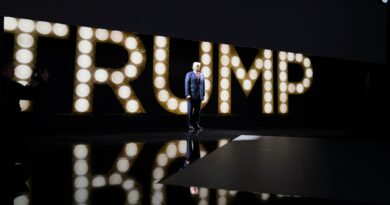Analysis | As NATO summit begins, Lithuania struts big on world stage
But on the matter of Ukraine, questions loom over what path to membership NATO should offer as the country fends off Russian invasion, and at what pace NATO may work to bring Ukraine fully into the alliance after hostilities with Russia cease. Leading figures like President Biden and German Chancellor Olaf Scholz are hesitant to put full membership on the table now, and instead want to focus allies on how to deliver Ukraine the defense capacity and weaponry it needs in the near- and medium-term. Biden floated the analogy of Israel, suggesting a Western commitment to Ukraine’s protection that’s ironclad and implicit, but without the formal structures and obligations of NATO.
The summit’s hosts are more ambitious. “As a temporary solution on the path toward full integration … in NATO, it might be considered. And it is a quite beneficial form of cooperation,” Lithuanian President Gitanas Nauseda told CNBC, referring to a package of interim security guarantees. “But this is not a replacement for the full-fledged membership in NATO.”
Like Poland and its Baltic neighbors, Lithuania is a vociferous backer of the Ukrainian cause and keen for the meeting in its capital to deliver for Kyiv. For months, Lithuania’s leaders have been calling for more arms and military aid for Ukraine, and have cocked a skeptical brow at any hint of concession or softening toward the Kremlin. It has spent more than 1 percent of its gross domestic product in bilateral assistance to Ukraine — a far greater ratio than the bigger European economies to the west. The country’s defense spending is nearing 3 percent of GDP, a mark that far surpasses the majority of NATO nations, which have struggled to even reach the alliance’s mandated 2 percent threshold.
In a Monday op-ed in The Washington Post, eight foreign ministers of Baltic and Nordic states, including Lithuania’s Gabrielius Landsbergis, called for Ukraine’s long-term integration into Europe, both through NATO and the European Union, as well as major commitments to help Kyiv win the war now. “This week, we want to see ambitious steps bringing Ukraine closer to NATO and upscaling our practical support, both financially and longer-term,” they wrote.
For Lithuania, rebuffing the Russian invasion of Ukraine is an existential cause. “We still have a very clear historic memory of my country being under occupation,” Landsbergis, 41, told the Wall Street Journal earlier this year, referring to when Soviet forces attempted to pro-independence protests in Vilnius in 1991. “I’m a youngish politician, but I remember it, as does the current young generation in Parliament.”
The permanent Baltic wariness of Russian coercion and threat is something that undergirds their convictions now. Dalia Grybauskaite, Lithuania’s former president, told the Associated Press in a recent interview that Western governments had failed her part of the world in their lax reaction to Russia’s 2014 illegal annexation of Crimea and fomenting of insurgency in southeastern Ukraine.
“After the Crimea occupation, the reaction from the West was very slow, despite Russia demonstrating openly in broad daylight that it could occupy the territories of neighboring countries,” Grybauskaite said, warning that the summit this week may still showcase divisions over how to reckon with Russia.
While strategists in Washington or Berlin may be more cautious about a wholesale political embrace of Ukraine or further alienating Moscow, officials and diplomats in many former Soviet countries have a different perspective, born out of a desire to belong to the European political project and fear over slipping away from its orbit. A troublesome purgatory may await Ukraine in the years to come if it’s denied the E.U. and NATO entries it seeks.
“The poorly governed, unstable countries of the Western Balkans, prone to Russian and Chinese interference, provide a warning about where prolonged ‘candidate status’ and European indecision might lead,” explained Dalibor Rohac of the American Enterprise Institute.
But Lithuania’s leadership isn’t just concerned about its immediate neighborhood. Landsbergis and his colleagues are among the most outspoken European critics of China and backers of Taiwan. In 2021, tiny Lithuania found itself locked in a geopolitical standoff with Beijing over its decision to allow Taiwan to open a representative office in Vilnius under the name of “Taiwan.” (China tolerates such missions listed as that of “Taipei,” as is the case with Taiwan’s office in Washington.)
Lithuania held firm, and China eventually opted to restore what nominal trade ties exist between the countries — a decision, Lansbergis contends, proved that it was possible to resist China and “not lower our threshold when it comes to values.” Now, in the wake of Russia’s invasion of Ukraine, Lithuanian officials are turning their particular geopolitical perch into a bully pulpit.
Last week, the country’s government issued a policy document on “Indo-Pacific” strategy. Other European countries have done the same in recent months, no matter their distance from the region, but Lithuania’s document is more hawkish than the rest. Even as Vilnius formally recognizes Beijing over Taipei, it described expanding trade ties with Taiwan as one of its “strategic priorities” and advocated a joint approach to “curtailing the spread” of both Russian “disinformation” and China’s “informational pressure” against Taiwan.
“Military support for Russia’s war of aggression against Ukraine or using force or coercion to change the status quo in the Taiwan Strait are red lines” in Lithuania’s view that, if violated, would incur the wrath of like-minded countries.
That’s tough talk from a country with fewer than 3 million people and a deep reliance on larger NATO powers for its security. But Lithuania’s government sees itself on the ramparts of a broader geopolitical struggle. The document reads, “unsuccessful attempts by China to exert economic and diplomatic pressure on Lithuania proves that a country can withstand economic blackmail if it has built up societal resilience and has reliable partners.”




